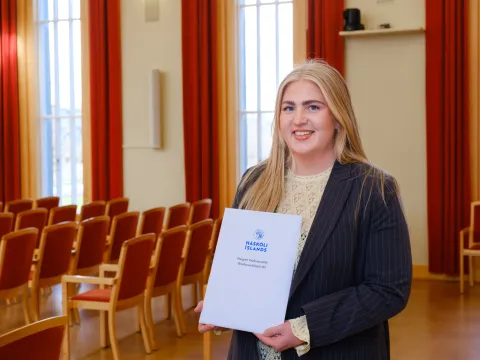
“There are many former and current athletes at my workplace, and we often discuss whether sports participation provides valuable experience in professional life. I work as a project manager with various specialists, developers, and businesspeople. I have a great interest in how we get people to collaborate and achieve the best results in a team,” says Margrét Valdimarsdóttir, who was among those who received their graduation certificates from the University of Iceland at the end of October. In her Master's thesis in Industrial Engineering, Margrét examined outstanding teams in sports and business, investigating the qualities that the teams themselves believed made them exceptional.
Margrét currently works for Creditinfo, and she had a long and successful career as a handball player for ÍR earlier in her life. “I played handball until the age of 25 and was, and still am, curious as to whether that experience benefits my work in professional life. This line of thought gave birth to the idea for the project,” she says.
She conducted the research under the supervision of Rögnvaldur Sæmundsson, Professor and current Pro-Rector. “I conducted so-called semi-structured interviews with individuals from outstanding teams in business on one hand, and sports on the other. The teams' qualities were systematically extracted from the interviews and classified according to the project's theoretical framework. To get more precise results, I narrowed the definitions of the fields and only examined teams in ball sports and software teams,” says Margrét, who interviewed representatives from two ball sports teams—the Víkingur men’s football team and the Valur women’s handball team—and two software teams, one from Creditinfo and one from Trackwell, in total twelve individuals.
“The results show both the qualities that the fields share and what differs between them. Many qualities in these areas are shared, but it is also evident that the characteristics can be different. 'Soft,' social factors such as cooperation, team spirit, good teammates, and open communication play a key role in making teams outstanding in both fields. Leadership and the structure surrounding the team are also important, but these factors differ significantly between the sports and software teams. This is demonstrated, for instance, by the fact that managers in the software teams give people space to solve their tasks but support and step in when needed. On the other hand, coasches of the sports teams lead with high discipline and a strict, structured approach,” Margrét observes.
She also says it's interesting that the software teams mentioned certain factors as "fundamental" to the work of outstanding teams, speaking of them as if they were almost a given. “The sports teams placed considerable emphasis on these same factors. These are individual ambition, individual quality, influence from senior management, and the team's framework and facilities,” she says.
When asked how the research can be utilised, Margrét notes that it supports the idea that sports and even other social involvement can be considered a valuable experience in the job market. “It may also inspire other researchers to conduct further studies on teams in professional life compared to teams in sports,” she adds.
Studying alongside work is highly demanding, and Margrét also had two children during her studies. When asked what is next after graduation, Margrét says she will continue to work at Creditinfo, where she has been since completing her BSc degree in 2019. “I’m just looking forward to 'just' working while being a mum to my boys,” she concludes.